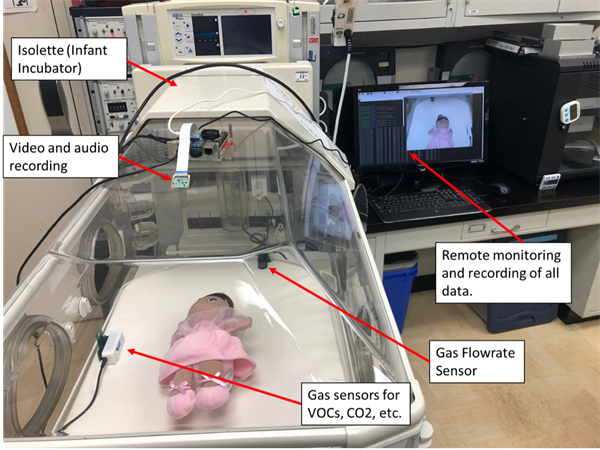Isolette-Msa, The Intelligent Isolette Through Integration Of Artificial Intelligence (Ai) Drive Multi-Sensors
Full Description
Background
According to data maintained by the March of Dimes, in 2022 10.4% of live births were preterm births in the United States. Prematurely born babies can have problems such as low birth weight, irregular temperature and/or unstable vital signs. An incubator provides an ideal environment for a premature baby to grow and thrive in a less controlled environment. Medical care providers review multiple variables that help monitor and remedy any challenges that could affect the health of an infant. However, there is a lack of integrated monitoring of the infant and the incubator environment that could facilitate timely intervention.
Technology
An inter-institutional team of researchers have developed a prototype, intelligent isolette that employs a wide variety of sensors. These sensors enable the care providers to monitor conditions and the potential for complications simultaneously. By monitoring a wide variety of clinical parameters and coupled with trained machine learning models, the developed system will provide valuable information to physicians and care providers - allowing them to provide optimal treatment as well as assist them in the early detection of potential complications. This will significantly improve the care provided to infants.
Image

Illustration of the intelligent neonatal incubator.
Advantages
- Integrated monitoring system with advanced machine learning models that supports the care for infants to optimal health.
- By measuring a wide variety of environmental and clinical variables in real-time, the system provides appropriate alerts to care providers to manage and improve the health of infants.
- Empowers physicians and clinicians to better monitor and treat infants in incubators. By leveraging advanced machine learning models, the system provides decision support to care providers and the opportunity to recognize early signs of potential complications.
- The integrated monitoring system may also be used to automatically regulate incubator conditions to ensure optimal health outcomes for infants.
- Improves patient outcomes and reduces the risk of complications.
- The collected sensor data and clinical parameters can be streamed in real-time for remote monitoring.
Application
Neonatal intensive care units (NICUs) and advanced infant incubators to better manage and care for infants.
State Of Development
- The team has developed and demonstrated the functionality of a minimum viable product using internal resources and funding.
- The team is interested in appropriate partnership and collaboration to further develop the product and obtain clinical data - with a view to commercialization.
Patent Status
Patent Pending
Contact
- Venkata S. Krishnamurty
- venkata.krishnamurty@ucr.edu
- tel: View Phone Number.
